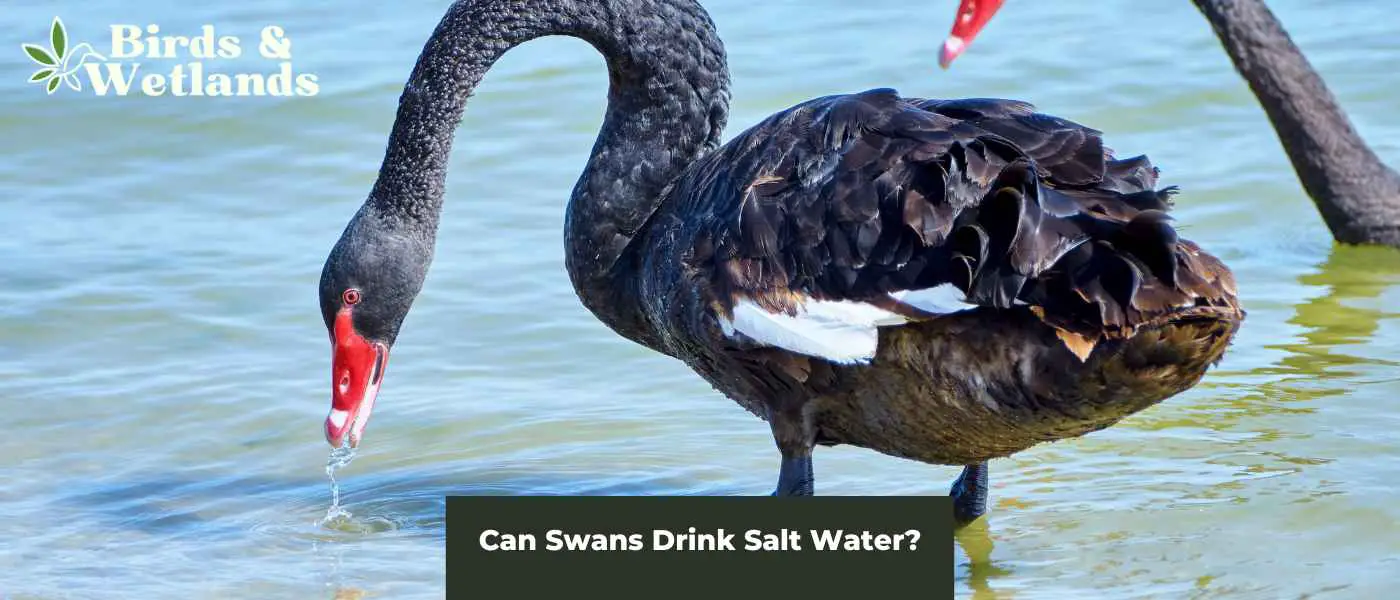Swans are a type of waterfowl that can be found in various habitats, including freshwater lakes and rivers, as well as saltwater and brackish habitats along coastlines.
Some species of swans, such as the mute swan, are typically found in freshwater environments, while others, like the black swan, are more commonly found in coastal areas and estuaries.
Swans can drink saltwater, as they have specialized salt glands in their heads that allow them to filter out the salt before it enters their bodies or expels salt from their bloodstream.
The Australian black swans that can thrive in saltwater environments are good examples of this adaptability. These swans are commonly found along the coastlines of Australia and can be seen swimming in both freshwater and saltwater habitats.
Key Takeaways on Can Swans Drink Saltwater
Can swans drink seawater?
Some swans, such as the mute and black swans, are beautiful birds with very long necks that live in coastal and brackish waters. These environments are often characterized by high salinity levels, making it difficult for animals to obtain fresh water for drinking.
Despite this limitation, these swans have adapted to be able to drink seawater to keep themselves hydrated. They can do this by filtering out the excess salts from the seawater before it enters their blood stream.
This specialized gland removes salt and allows them to consume the water they need while avoiding the negative effects of excessive salt intake. The salt is eliminated through the nares when the swan shakes its head.
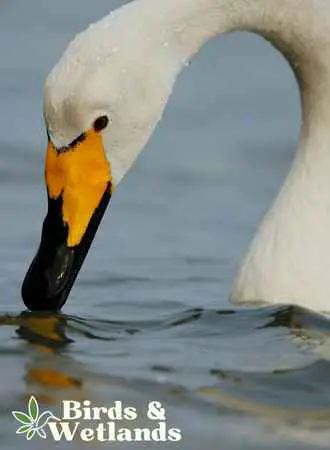
Do swans like saltwater?
Whether or not swans like drinking saltwater is uncertain. What is certain is that they need water for proper hydration, just like any other animal.
Most species of swans are known to live in various environments, including freshwater, brackish and coastal waters, and they have adapted to drink water from these different sources.
While some swans are known to live in coastal and brackish waters and have adapted to be able to drink seawater, this does not necessarily mean that they prefer it.
Swans still need water for proper hydration, regardless of whether it is saltwater or freshwater. In fact, local swans in freshwater environments have been observed to drink from saltwater sources when no freshwater is available, demonstrating their ability to adapt and survive in different environments.
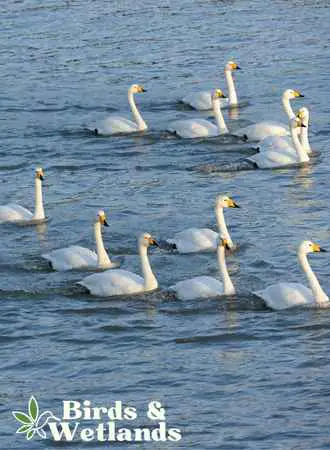
Do mute swans drink freshwater?
Mute swans, also known as Cygnus olor, are aquatic birds that primarily inhabit freshwater habitats such as freshwater ponds, lakes, rivers, and marshes.
Most mute swans are known to drink freshwater and consume green plants such as sea arrow grass, eel grass, wigeon grass, green algae and salt marsh grass, swan mussel, pond skaters and frogs eggs as part of their diet.
Many swans are primarily herbivores but they eat animal matter. Most of these birds consume food equivalent to about 20% to 25% of their body mass since they are warm-blooded animals.
Mute swans can also be found in saltwater habitats but primarily inhabit freshwater environments. It is not uncommon to see a swan drinking freshwater from the snow melting near the end of the winter season.
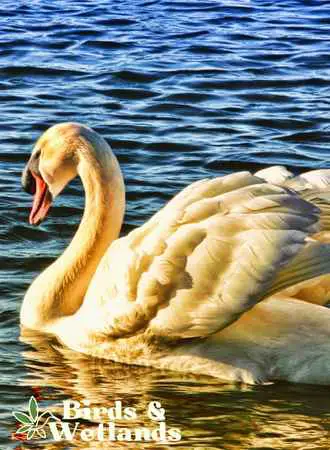
Related Questions on What Swans Eat and Drink and Other Swan Behaviors
Do whooper swans have built-in water desalination filters?
The whooper swan, also known as Cygnus cygnus, are aquatic birds that primarily inhabit freshwater habitats such as lakes, rivers, and marshes. They can also be found in saltwater habitats such as coastal areas but do not have built-in water desalination filters. They can drink salt water by excreting salt through the ducts in their bill.
Many marine birds such as seagulls and pelicans have water desalination filters that allow them to eat prey or drink seawater straight up.
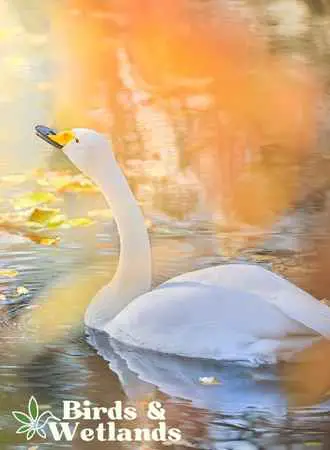
Do swans mate for life?
Many species of swans, particularly mute and trumpeter swans, are known for their kind and goodhearted nature. They also exhibit monogamous mating behavior. They typically form pairs at a young age and remain together for the rest of their lives.
The bond between male swans (called cobs) and female swans (called pens) is strong and can be observed through their physical affection toward one another. This can include preening, mutual feeding, and even synchronized swimming.
However, it is important to note that not all swans may mate for life. For example, tundra and whooper swans exhibit less monogamous behavior and may change partners throughout their lives or during the breeding season.
Additionally, if one pair member dies or is unable to breed, the remaining swan will often find a new mate. Despite this, most swans are still considered to have a strong pair bond and typically spend most of their lives with a single mate.
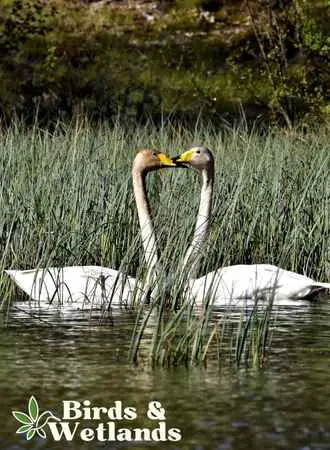
Why does a swan to fold one of its legs up onto its back?
It is normal for swans to fold one of their legs up onto their back, especially when they are resting or sleeping. This behavior is known as “tucking,” It helps regulate body temperature, conserve body heat, and protect their legs and feet from cold water and predators.
When a swan is tucking, it typically tucks one leg up against its body while keeping the other leg stretched out in the water. This allows them to take off into flight if there is any danger quickly.
It is important to note that swans can tuck both legs up when they are in a very relaxed state or preparing to sleep. However, the swan should be able to extend both legs again when awake and active.
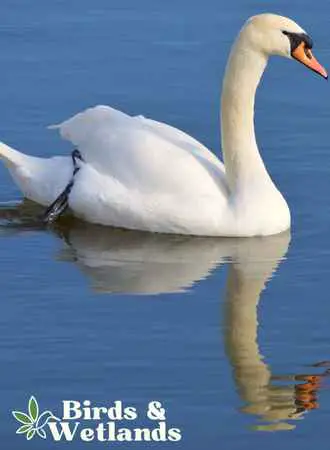
How long do mute swans live in the wild?
Most wild mute swans live only to twelve years. Other swans in the wild live for over twenty years. Factor such as food availability, diseases and predation affect the lifespan of most wild animals.
Can swans eat mouldy bread?
Swans should not be eating moldy food because it can cause health problems.

